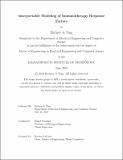Interpretable Modeling of Immunotherapy Response Factors
Author(s)
Ting, Britney A.
DownloadThesis PDF (6.208Mb)
Advisor
Fraenkel, Ernest
Terms of use
Metadata
Show full item recordAbstract
Immunotherapy, which treats cancer by either stimulating or suppressing the immune system, has been extraordinarily effective for some cancers, such as breast cancer and B-cell lymphoma. A type of immunotherapy, checkpoint inhibitors work by blocking the ability of cancer cells to evade immune system detection. However, not all patients respond to checkpoint inhibitors, even those with the same tumor types, and the complexity of biological networks and diversity of patients makes it difficult for clinicians to understand why a patient does not respond to treatment. This thesis integrates RNA and whole-exome seqeuencing (WES) data into an interpretable machine learning model and investigates genetic factors that may separate responders from nonresponders. We discovered that both data types contribute to response separation and that certain gene sets may be especially important factors for predicting response. Further analysis to elucidate how much individual genes contribute to significant gene sets and response needs to be performed.
Date issued
2023-06Department
Massachusetts Institute of Technology. Department of Electrical Engineering and Computer SciencePublisher
Massachusetts Institute of Technology